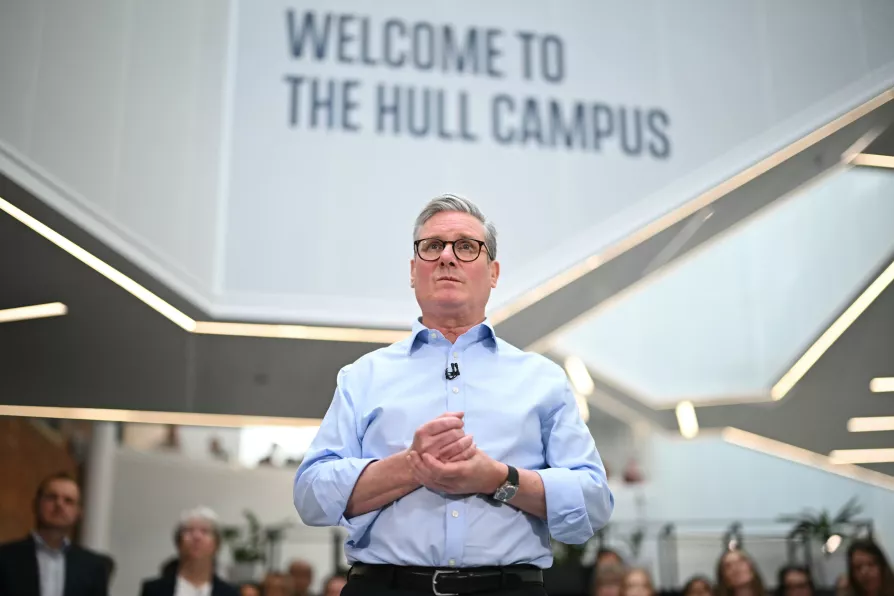
 Prime Minister Keir Starmer during a Q&A session after delivering a speech where he announced NHS England will be abolished to "cut bureaucracy" and bring management of the health service "back into democratic control" during a visit to Reckitt Benckiser Health Care UK Ltd in Kingston upon Hull, East Yorkshire, March 13, 2025
Prime Minister Keir Starmer during a Q&A session after delivering a speech where he announced NHS England will be abolished to "cut bureaucracy" and bring management of the health service "back into democratic control" during a visit to Reckitt Benckiser Health Care UK Ltd in Kingston upon Hull, East Yorkshire, March 13, 2025
KEIR STARMER’S onslaught on a “flabby” state, starting with the abolition of NHS England, needs to be seen alongside the government’s other major initiatives of the last two weeks.
These are the decision to spend far more on the military and to take an axe to welfare benefits. These moves — none of which were put before the public at last July’s general election — represent a reordering of the ruling class’s priorities and a reconfiguration of the state machinery to match.
Britain now faces a world of more intense struggle between rival capitalist powers, with old alliances shaken and familiar certainties upended. Trade war is a here-and-now reality, and actual war looms on the horizon.
In one sense, this is a delayed after-shock of the 2008 bankers’ crash, which broke the prevailing model of globalised capitalism and has left Britain a country scarred more than ever by poverty and inequality with an increasingly dysfunctional state incapable of delivering basic functions.
Millions of working people have experienced a lost generation of stagnant living standards, public services in mounting disrepair and social atomisation.
For all of Starmer’s airy talk of Artificial Intelligence and digitalisation, his present course is not going to reverse that any time soon.
Instead, his strategy is dominated by a looming budgetary crisis exacerbated by his decision to commit more and more of the country’s wealth to militarism.
Trade unions are right to warn that the cuts in the NHS — laughably dressed up as an exercise in extending democratic control, as if that was one of the cabinet’s preoccupations — could add increased pressure onto front-line workers.
They are also correct to object to the apparently rushed nature of the announcement, with no prior negotiation or signs of a strategy.
It is not as if staff in NHS England — a product of the reforms introduced by Tory minister Andrew Lansley in 2012 — were doing nothing at all, and the idea that thousands of jobs can be axed without consequences is nonsensical.
And the claim that the resources freed up will mean more doctors and nurses risks echoing Boris Johnson’s notorious claim that leaving the European Union would add billions to the NHS budget. We are still waiting.
The underlying drive is to roll back the post-war gains of the working class still further, particularly in relation to the welfare cuts, the better to make the British state more competitive for the struggles ahead.
However, Starmer is not lying when he says that he believes “in the power of the state.” He has proved that again and again when it comes to its core coercive functions.
The state that wears a uniform, that restricts protest, that hands down draconian sentences and may be soon extending its reach to the battlefields of Ukraine, he is clearly committed to.
It is those forces that will be the main beneficiaries of the shakeout elsewhere. It all underlines the folly of welcoming the arms spending increases. Already the bill is falling due.
None of these proposals will solve the underlying weaknesses of the British economy and society. And they will not, indeed cannot, address the fundamental problem of the state.
That is not the issue of whether it is flabby or agile, but the interests it serves. Those are determined by the capitalist class, and the state — to be distinguished from the services it provides — is an institution alienated from society mandated above all to preserve property relations and the accumulation of capital.
In a world setting of vicious competition and mounting tensions, Starmer’s speech therefore solves nothing. The state that is needed is not large or small, but working-class.

As Starmer flies to Albania seeking deportation camps while praising Giorgia Meloni, KEVIN OVENDEN warns that without massive campaigns rejecting this new overt government xenophobia, Britain faces a soaring hard right and emboldened fascist thugs on the streets













